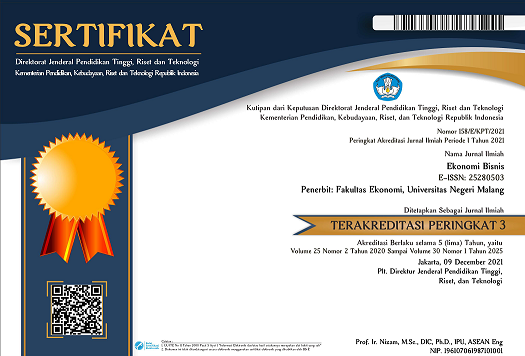INSTITUSIONALISASI INTERNAL AUDIT CAPABILITY MODEL PADA APARAT PENGAWASAN INTERN PEMERINTAH (STUDI KASUS DI KEMENTERIAN LUAR NEGERI)
Abstract
Abstract: The purpose of this research was to gain an understanding of the workings of the institutionalization process of Internal Audit capabilty Model (IACM) on APIP in Ministry of Foreign Affairs, with an emphasis on the institutionalization process and its implications, which was used as a tool to assess and enhance the capabilities of the self-assesment intended APIP. APIP can identifies the fundamentals needed for effective internal auditing and shows the steps in progressing level, and its implications. The method used was qualitative, with case studies based on theoretical propositions as a research strategy. The background of IACM institutionalization was analyzed using Institutional Theory, and the implications that occured were analyzed based on Lewin’s theory of Organizational Change (1951). The results shows that coercive isomorphism is the most powerful driver of institutionalization process was the pressure from BPKP as APIP’s Lead Agency, followed by the Presidential directive to achieve 2019 targets. Analysis based on movement stages according to Lewin’s Theory where APIP was forced to make implement changes to the organization through IACM asssessment, where APIP units must perform several steps in each phase. Implications will make APIP more capable of recognize its conditions and capabilities, improvements required to be done by individuals, teams and the organization.
Keyword: institusionalitation, internal audit, capability model
Abstrak: Penelitian ini bertujuan untuk memperoleh pemahaman tentang institusionalisasi Internal Audit Capabilty Model (IACM) pada APIP Kementerian Luar Negeri dan implikasinya, dimana IACM merupakan tools untuk menilai dan meningkatkan kapabilitas APIP yang dilakukan secara mandiri, dengan menggunakan strategi penelitian studi kasus berdasarkan proposisi teoritis. Dimana latar belakang institusionalisasi IACM dianalisis dengan menggunakan Teori Institusional, dan implikasi yang terjadi dianalisis dengan teori Perubahan Organisasi berdasarkan tahapan perubahan menurut Lewin (1951). Hasil penelitian menunjukkan bahwa coercive isomorphism menjadi gejala terkuat yang mendorong dilakukannya institusionalisasi IACM. Tekanan berasal dari BPKP yang merupakan Lead Agency APIP, dan arahan Presiden RI yang telah menetapkan target capaian tingkat kapabilitas APIP Nasional di tahun 2019. Melihat model tahapan perubahan Lewin (1951) disini APIP dipaksa melewati beberapa fase perubahan terhadap organisasinya melalui asssessment IACM. Implikasi yang terlihat APIP terbantu memetakan rencana aksi yang akan dilakukan untuk memperbaiki dan meningkatkan tingkat kapabilitasnya.
Kata kunci: institusionalisasi, internal audit, model kapabilitas.
Full Text:
PDFDOI: http://dx.doi.org/10.17977/um042v22i2p87-102
Refbacks
- There are currently no refbacks.
Ekonomi Bisnis is licensed under a Creative Commons Attribution-ShareAlike 4.0 International License



